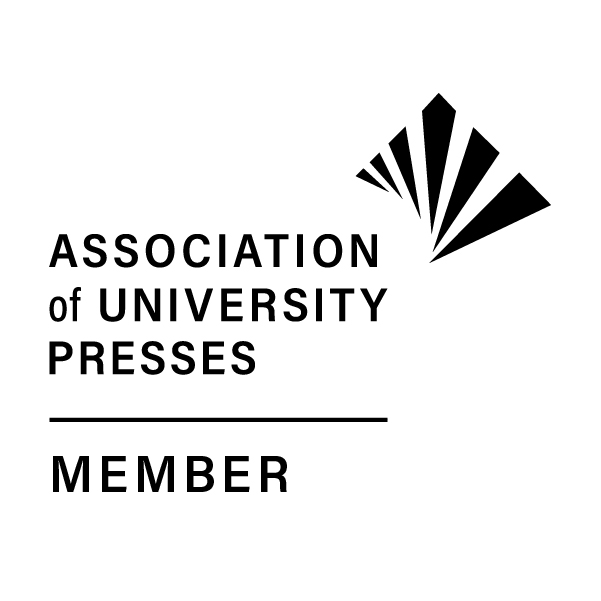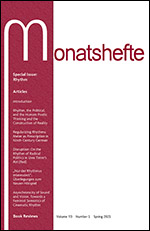
|
|
MonatshefteVolume 109, Number 1, Spring 2017 Table of ContentsARTICLES Jan Oliver Jost-Fritz Romantic Coherence. Atmosphere and the Absolute in Tieck’s Frühlingsreise For Ludwig Tieck, romantic poetry is the endeavor of the finite subject to grasp the infinite of nature. This article considers Tieck’s contribution to early romantic aesthetics by reading his poem Frühlingsreise (1797) against the backdrop of recent reflections on the concepts of atmosphere (Schmitz, Böhme), and the romantic absolute (Lacoue-Labarthe/Nancy, Frank, Beiser, Nassar). The absolute, and its impact on the conceptualization of subject and object, constitutes a centerpiece of romantic thought. In contrast to F. Schlegel and Novalis, Tieck approached the absolute not via intensive studies of contemporary philosophy, but via a ‘poetic path,’ i.e., by exploring poetry’s own potentialities in poetic practice. Both the absolute and atmosphere transcend the clear distinction between subject and object, and this structural parallel allows Tieck to approximate the otherwise unrepresentable absolute in poetry.
Manuel Clemens Lauschen als Bildungserlebnis Nietzsches Vorträge Über die Zukunft unserer Bildungsanstalten My reading of Nietzsche’s lectures On the Future of our Educational Institutions argues that Nietzsche’s praise of the Greek genius as a role model for the unity of art and life does not provide a solution for the educational problem of art’s transition into life and personal transformation. The problem is first demonstrated by an analysis of Schiller’s Letters on the Aesthetic Education of Man that leave the subject in a problematic intermediate zone between art, politics, and life. Subsequently, I identify narrative details of successful transitions in Nietzsche’s Lectures such as the metaphor of the dream (which envisions this desired unity) and in instances of indirect learning through over-hearing.
Zohar Maor Max Brod and the Spell of Violence In writer, poet, thinker, and politician Max Brod’s turbulent life, violence was a burning existential question. This paper follows Brod’s confrontation with political violence in three periods of his long career: in the first decade of the twentieth century, when he was still a cosmopolitan and an aestheticist; during the Great War and its aftermath, a few years after his Zionist conversion, and in the 1940s, after forced immigration to Palestine, when the brutal reality tested his earlier convictions. In his youth, Brod suggested his “indifferentism” as a way to neutralize the psychological sources of violence. After his Zionist conversion, he tried to rule out violence without ignoring the violent character of life and the allures of naturality and instincts that justify violence. Brod’s prose proffers various strategies how Zionism can cautiously use violence without betraying its ethical self-image.
David-Christopher Assmann Die Schreib-Szene als Literaturbetriebs-Szene: Rainald Goetz’ loslabern This article examines how Rainald Goetz’s loslabern (2009) mirrors the sociostructural circumstances of German literature of the noughts. By cancelling the differences of text and paratext, object- and metalevel, and reality and fiction Goetz’s ‘report’ reflects and subverts the distinction between literary boulevard and literary practice. Thus, loslabern not only realizes a specific literary ‘work,’ but also presents itself as part of the literary boulevard (‘Literaturbetriebs-Szene’).
Petra Landfester Local and Transnational Claims in the Films of Fatih Akin: Recognition and the Gaze at the Body in Akin and Fassbinder’s Films Fatih Akin heads the newest wave of prize-winning filmmakers in Germany with his productions, which often rely upon chronotopes such as rootlessness and homecoming to increase the marketability of films within the realm of what Hamid Naficy termed ‘accented cinema,’ films portraying “an aesthetic response to displacement through exile, migration or diaspora.” However, Akin moves beyond those themes and plays with expectations around raced and gendered bodies particularly with his casting choices. Akin’s films depict bodies that elicit visceral responses from the audience that have allowed him to be viewed as more than a mere “representative of Turkish German film.” In this article, I analyze Gegen die Wand (2004), Kebab Connection (2004), and Auf der anderen Seite (2007) to explore how Akin claims “membership” in a local and transnational film community and which intertextual references Akin makes to Rainer Werner Fassbinder’s films, highlighting how he draws upon Fassbinder’s gaze at the body.
Gabriele Eichmanns Maier Shoes, Shopping, and the Search for Mr. Right: Investigating the Trivial in Recent Turkish-German Chick Lit In this article, I explore how popular Turkish-German fiction written for a primarily female audience—a genre also known as “chick lit”—negotiates differences between German and Turkish culture. Examining Sibel Susann Teoman’s Türkischer Mokka mit Schuss (2007) and Hatice Akywün’s Einmal Hans mit scharfer Soße (2005) and Ali zum Dessert (2008), I depict how these texts play with typical devices of the chick-lit genre, such as the use of humorous narrative strategies and the topos of the fairy-tale, in an attempt to erase cultural differences and long-standing stereotypes held against Turkish-German women and, in turn, to advocate for a more inclusive view of German society. I investigate how the humorous remarks of their respective protagonists serve as important literary devices employed to negotiate complex hybrid identities and how humor bridges perceived differences and exposes false beliefs that inhibit the development of a just society.
BOOK REVIEWS Boos, Sonja, Speaking the Unspeakable in Postwar Germany: Toward a Public Discourse on the Holocaust (Felix Tweraser) Böschenstein, Bernhard, Die Sprengkraft der Miniatur: Zur Kurzprosa Robert Walsers, Kafkas, Musils, mit einer antithetischen Eröffnung zu Thomas Mann (Florence Vatan) Brockmann, Stephen, The Writers’ State: Constructing East German Literature, 1945–1959 (April Eisman) Bunia, Remigius, Metrik und Kulturpolitik. Verstheorie bei Opitz, Klopstock und Bürger in der europäischen Tradition (Tanvi Solanki) Classen, Albrecht, The Forest in Medieval German Literature: Ecocritical Readings from a Historical Perspective (Erhard Schütz) Crăciun, Ioana, Die Dekonstruktion des Bürgerlichen im Stummfilm der Weimarer Republik (Ofer Ashkenazi) Eldridge, Sarah Vandegrift, Novel Affinities: Composing the Family in the German Novel, 1795–1830 (Susan Gustafson) Halverson, Rachel J. and Carol Anne Costabile-Heming, eds., Taking Stock of German Studies in the United States: The New Millennium (Helga G. Braunbeck) Hasty, Will, The Medieval Risk-Reward Society: Courts, Adventure, and Love in the European Middle Ages (Albrecht Classen) Hofmann, Michael und Iulia-Karin Patrut, Einführung in die interkulturelle Literatur (Elke Segelcke) Holub, Robert C., Nietzsche’s Jewish Problem: Between Anti-Semitism and Anti-Judaism (Steven E. Aschheim) Meier, Lars, Konzepte ästhetischer Erziehung bei Schiller und Hölderlin (Peter Höyng) Noyes, John K., Herder: Aesthetics against Imperialism (Lynn Zastoupil) Pflaumbaum, Christoph, Carolin Rocks, Christian Schmitt und Stefan Tetzlaff, Hrsg., Ästhetik des Zufalls. Ordnungen des Unvorhersehbaren in Literatur und Theorie (Brett Martz) Rentschler, Eric, The Use and Abuse of Cinema: German Legacies from the Weimar Era to the Present (Barton Byg) Richter, Gerhard, Inheriting Walter Benjamin (Rolf J. Goebel) Scribner, Charity, After the Red Army Faction: Gender, Culture, and Militancy (Sonja E. Klocke) Shen, Qinna, The Politics of Magic: DEFA Fairy-Tale Films (Sonja Fritzsche) Shortt, Linda, German Narratives of Belonging: Writing Generation and Place in the Twenty-First Century (Alexandra M. Hill) Tobin, Robert Deam, Peripheral Desires: The German Discovery of Sex (Erik Jensen) Trawny, Peter, Heidegger und der Mythos der jüdischen Weltverschwörung (3., überarbeitete und erweiterte Auflage) (Brad Prager) Trawny, Peter, Trans. Andrew J. Mitchell, Heidegger and the Myth of a Jewish World Conspiracy (Brad Prager) Voßkamp, Wilhelm, Emblematik der Zukunft. Poetik und Geschichte literarischer Utopien von Thomas Morus bis Robert Musil (Klaus L. Berghahn) Wagner, Meike, Hrsg., Agenten der Öffentlichkeit. Theater und Medien im frühen 19. Jahrhundert (Brigitte E. Jirku) Wolf, Werner and Walter Bernhart, eds., Silence and Absence in Literature and Music (Rolf J. Goebel) |

